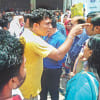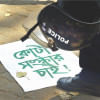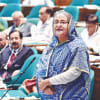Committee for quota review may seek 90 more days
The committee formed on July 2 to “review, reform or cancel” the quota system for civil service may seek 90 more working days as it has not finished collecting information and reviewing reports about the system, sources said.
The committee, led by Cabinet Secretary M Shafiul Alam, was asked to submit a report within 15 workings days, the deadline of which will expire on Monday.
After its formation, the committee held only one meeting on July 8, where it decided that it would study reports on the quota system prepared by previous committees and a commission.
The committee also decided to review such quota provisions in other countries before putting forward its suggestions.
At the time, the committee hoped they would complete the task within the given time.
However, a second meeting could not be held as the cabinet secretary fell ill, said sources in the committee.
Given the situation, the committee will ask for the deadline to be extended by 90 working days and will send a proposal in this regard to the prime minister for her approval, the sources said.
The committee is likely to hold the second meeting on Sunday if the cabinet secretary recovers from his illness.
Other members of the committee are secretaries to public administration ministry, finance ministry, Liberation War affairs ministry, law ministry (legislative division), Public Service Commission, and the secretary to the Prime Minister's Office.
The government formed the committee amid protests by students and jobseekers demanding reformation to the quota system.
In February, students of different public universities, along with jobseekers, gathered under the banner of "Bangladesh Sadharan Chhatra Adhikar Sangrakkhan Parishad" and waged a movement demanding reforms in the quota for civil service.
In late April, students of public and private universities across the country took to the streets and blocked key points in the capital and roads and highways elsewhere.
Amid the protests, Prime Minister Sheikh Hasina in parliament on April 11 spoke about abolishing all types of quotas in public jobs.
But as no gazette notification was issued in this regard, the protesters started an indefinite boycott of classes and examinations in all universities and colleges on May 14.
Afterwards, the PM on July 12 in parliament said it was not possible to reform the freedom fighters' quota in public jobs due to a High Court verdict.
PROTESTS CONTINUE
Under the banner of "All Combined Departments", around 500 students from different departments of Dhaka University formed a human chain on the Central Shaheed Minar premises in Dhaka, demanding exemplary punishment for those who attacked the quota reformists.
Holding various placards protesting the recent attacks, they also demanded the release of quota reform leaders who are under arrest and a safe campus for all.
“We urge the government to withdraw all the cases filed with different police stations during the quota reform movement in April,” said Nahid Islam, a student of university's sociology department, at the programme.
Those who attacked students and teachers at DU and Rajshahi and Chittagong universities will have to be identified and brought to justice, he added.
Expressing solidarity with the students, assistant professor of DU's economics department Rushad Faridi said, “Human chains were held on the campus over trifling issues before but the students are now afraid to stand at the Shaheed Minar as the BCL has created terror on the campus.”
He said he had talked with some BCL leaders who told him that they [BCL] attacked the protestors as there was a presence of anti-liberation forces and those who attacked the VC residence among the protestors.
“I told them vandalising the VC residence is a crime but arrest them [those responsible] with proper evidence. But they [protestors] are being placed in remand without any evidence,” he said.
He also said that some university students became “cadres” as they were brainwashed by the BCL men.
“Chhatra League activists believe in a kind of ideology. The mechanism of brainwash starts in the first year and the visitor's room is the training camp of cadres.
“When a fresher enters the visitor's room, he goes under so much torture that his mentality changes after some time. He does not remain a “normal student”,” he claimed.
Elsewhere, students of the university's history department formed a human chain programme at the Aparejeyo Bangla premises, protesting the recent attack on their fellow student Tanzir Hossain Sarker and demanding a safe campus for students.
Associate professors Golam Saklayen Saki and MM Kawser were present at the human chain joined by around 200 students of the department.
Later, the students brought out a silent procession from the spot.
Boycotting regular classes and examinations, several hundred students of Jahangirnagar University yesterday also formed a human chain on the campus protesting the recent spate of attacks on some teachers and students and demanded reformation in the existing quota system.
Meanwhile, Naripokkho, an organisation working for women's rights, yesterday expressed resentment and concern over the continuous physical assaults by BCL members on students demanding quota reforms and the teachers who stood by them.
In a statement, the organisation said the most condemnable incident was the sexual assault on the female participants in the quota reform movement.
Describing the July 2 attack on Moriom Mannan Farah, a first year honours student of Tejgaon College, at the Central Shaheed Minar and another incident which took place in April, the organisation said, "Naripokkho is extremely annoyed, concerned and ashamed of these incidents."
Criticising the role of the government and university authorities, the statement expressed the organisation's demand that the PM take stern steps to stop such “heinous activities of BCL” and establish rule of law in the country.

 For all latest news, follow The Daily Star's Google News channel.
For all latest news, follow The Daily Star's Google News channel. 







Comments